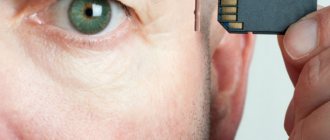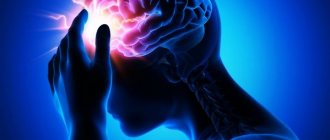Issues discussed in the material:
- What are the stages of dementia development?
- What drugs are used at the initial, moderate and severe stages of the disease
- What anti-dementia drugs are best for older people after a stroke?
- What drugs for dementia can be bought without a prescription?
Among the serious illnesses that beset people after 65 years of age, it is senile dementia - a disease that creates serious problems for an elderly person and his loved ones. The patient's memory, behavior, and speech undergo changes that he is not even aware of. Is it possible to alleviate a person’s condition, what medications for dementia in the elderly can help? This is exactly what will be discussed further.
How to recognize the development of deviations
The syndrome goes through only 3 stages, from initial to final, in which the pensioner ceases to recognize even his relatives. At the initial stage, memory simply deteriorates slightly. He doesn’t remember what happened, for example, six months ago or earlier. As a rule, little attention is paid to this, and the disease continues to progress. That is why, as soon as you suspect that something is wrong with your grandparents, mom or dad, it’s time to sound the alarm.
At times, the patient simply forgets events that happened an hour ago. The disease is making itself known more and more often. Over time, the ward will no longer be able to cope without help. When the process is running, it’s too late to do anything - all that’s left is to take care of it.
There is also so-called pseudodementia, when a person behaves as if he were sick. It can occur as a result of severe psychological trauma or against the background of a depressive state. These factors lead to changes in the nervous system.
In addition to memory loss, other symptoms include:
- lack of coordination;
- decreased attention;
- decreased desire for self-development;
- complete disadaptation in the social environment.
Classification of disease types
Divided into the following types:
- vascular;
- atrophic or Alzheimer's;
- mixed.
The first type appears due to a failure in cerebral circulation. The atrophic type contains primary degenerative processes. This is the first sign of Alzheimer's disease. Mixed, in turn, combines the 2 above types.
Leave a request for selection of a boarding house
for an elderly person with dementia
Diagnostic methods
It is impossible to make a diagnosis on your own, but there are special sites for testing attentiveness and memory. If a person agrees to take some tests online and they show an unsatisfactory result, they should go to the hospital.
First, the doctor will ask specific questions, such as:
- name, birthday of the patient and his family members, meal times;
- recent events (what happened in recent days);
- some questions from the biography (old and recent stories, literature read recently, events attended).
Next will be some tests for attention, coordination in time and space. Often these are oral tasks. If the disease occurs, you need to undergo diagnostic and more technological tests - MRI, biochemical studies, blood pressure, and a cardiogram. This is required to identify the cause of the disorder.
Medications for vascular dementia
The condition, called vascular cognitive impairment, refers to a decline in memory and cognitive function caused by a blockage of the blood supply to the brain. Cholinesterase inhibitors may benefit some people with vascular dementia, although the drugs are not approved for this purpose (most likely due to the drugs' effects on coexisting Alzheimer's disease pathology).
Because the main cause of vascular dementia is stroke, patients at high risk are given anticoagulants (warfarin) and antiplatelet drugs (aspirin) to prevent clots from forming in the blood vessels.
Senile dementia - prevention: comprehensive treatment measures and list of drugs
Naturally, there is no 100% guarantee that dementia will not occur. The following steps will help prevent the critical development of the disease or even prevent it:
- Proper nutrition is the key to a happy old age. It all depends on what we eat or drink. Your grandparent's diet should include fruits, vegetables and grains. These foods contain antioxidants that slow down cell destruction.
- It is necessary to control your weight. Regular light exercise and diet will help with this. Deviations can occur due to diabetes or obesity. Therefore, it is important to prevent these factors from occurring first.
- Smoking and alcohol are evil. You should get rid of bad habits as soon as possible.
- There are some means to slow down the development process. Of these, it is worth noting: Memantine and those that help reduce damage to blood vessels.
- It is important to frequently check and monitor cholesterol, blood glucose, and control blood pressure.
Features of drug treatment of dementia - drugs and medications for senile dementia in the elderly
All appointments are made by a neurologist. The doctor can prescribe pharmaceuticals that reduce the manifestation of the disease, making it less pronounced. This is the same Memantine or anticholinesterase substances. They are able to prevent cell destruction and improve the transmission of nerve impulses. If you have sleep problems, take sleeping pills. In case of depression, antidepressants will help, and if your relative is delusional or has mental disorders, the neurologist will recommend special tranquilizers.
Tablets, injections at the initial stage: list, how to take?
It is important to maintain basic brain function. At the initial stage, minor disturbances appear. For example, a person often begins to forget his glasses at home and does not turn off the water after washing his hands. There are tools that can strengthen memory and speed of information processing. These are vitamins and neurometabolic substances:
- Fluoxetine;
- Chlorprothixene;
- Citalopram;
- Novopassit – calms;
- Tinctures of peony or valerian.
Neuroleptics, vascular drugs, sleeping pills and other drugs for senile dementia and dementia in the elderly
Note:
- Risperidone;
- Olanzapine;
- Haloperidol.
Help with loss of sleep or mental disorders of varying severity. They must be taken separately as prescribed by a doctor. Pharmaceuticals that treat or alleviate insomnia will be discussed further.
They contain dopamine receptors. These are substances that prevent the development of psychoses - schizophrenia, bipolar shift, etc. You need to be careful with the dosage so as not to provoke side effects.
Tablets, injections, medications for moderate dementia: list of how to take
The relative must be under constant supervision. Memory deteriorates even more, the person loses coordination. However, basic self-care abilities are retained, so full control is not necessary.
Exelon is accepted at this stage. It belongs to the group of “acetylcholinesterase inhibitors”. This is a patch that is glued to a specific area of the skin. The dose and place of application are determined individually by a neurologist - do not self-medicate!
Also used for moderate dementia is Memantine, the “enemy” of NMDA receptors. If the condition does not improve after taking Exelon or Memantine and the same symptoms remain, medications and drugs for senile dementia in older people are changed to similar ones, but with completely different active substances in their composition.
Tablets, injections for severe forms: list, how to take?
At this stage of the syndrome, treatment is stopped. Means are used to improve the patient’s mental well-being, sleep, and peace of mind. Total care is required, since the ward is not able to control himself or make decisions on his own. He doesn't understand what's happening around him. Maximum participation is required from loved ones during this period.
Sedative, sleeping pills for the elderly with dementia and senile dementia in people
Act as auxiliary, supporting the psyche. It is almost impossible to stop the process of extinction; all that remains is to alleviate the condition. There are products based on herbs and other plant extracts:
- Phenibut – improves the functions of the circulatory system of the head. It normalizes sleep and improves attention, reaction speed, and perception of new information.
- Sonapax is a sleeping pill.
- Phenazepam - taken exclusively in emergency cases to relieve psychosis (attack of aggression, schizophrenia, hallucination).
Drugs for the early stages of dementia
Medications that relieve depression, antidepressants, are prescribed to improve the mood of a patient with dementia.
New generation medications: Fluoxetine, Venlafaxine.
Venlafaxine
Prescribed for schizophrenia and various mental disorders, in the presence of depression.
The negative effect is a mild narcotic side effect, associated with a pronounced blockade of norepinephrine at the site of contact between neurons where communication occurs.
Fluoxetine (Portal)
For milder depressive states. It has a milder effect than the previous medicine. The drug calms and stimulates the patient. It is often used in outpatient treatment.
The LEK company produces this medicine as Portal, which is easily absorbed by patients. There are almost no side effects.
The only contraindication is intolerance to Fluoxetine.
Problems with speech, memory, and thinking are helped by anti-dementia medications such as Aricept and Neuromidin.
Prices for Fluoxetine capsules 20 mg 20 pcs.
Prices for Fluoxetine capsules 20 mg 30 pcs.
Prices for Fluoxetine capsules 10 mg 20 pcs.
Arisept
These tablets are prescribed for the symptomatic treatment of mild to moderate dementia of the Alzheimer's type.
Prescription to patients with pulmonary diseases should be avoided. It is not recommended to take it concomitantly with other acetylcholinesterase inhibitors.
Possible side effects in the form of diarrhea, nausea, vomiting.
Neuromidin
Stimulates the conduction of impulses along nerve fibers, neuromuscular junctions between the central and peripheral nervous systems. This helps restore a person’s usual everyday skills and limb movement.
Prescribed for diseases of the central nervous system with cognitive disorders. Contraindicated for epilepsy, bronchial asthma, vestibular disorders.
Prices for Neuromidin tablets 50 pcs.
Patient care
24-hour care is required starting in the moderate stage. Let us recall that with a moderate disorder, memory deteriorates, a person periodically forgets what he did, for example, yesterday or even earlier, but vital functions remain practically unchanged.
Severe form - more serious. At this stage, treatment is impossible; only total care and concern for the patient with dementia is needed. Your relative will not be able to take a bath or go to the toilet on his own, delirium begins, and orientation in the environment becomes lost. The elderly man finds himself bedridden.
Drugs for the correction of emotional disorders
Severe behavioral and emotional disturbances are more characteristic of the moderate form of senile dementia.
For severe depressive disorders, preference is given to sedatives and antidepressants.
The duration of therapy depends on the severity of depression, but usually lasts more than six months.
This is due to the cumulative effect of antidepressants: the first improvements in a person’s mood can be observed only after 2-6 weeks after the start of the course.
Under no circumstances should you prescribe antidepressants yourself, since this group of drugs combines drugs with opposite effects. Clinical depression can be caused by various disorders, and incorrect therapy will only contribute to increased symptoms.
Sedative and hypnotic drugs are widely used in senile dementia. The choice of drug and dosage should be made by a doctor, since some sleeping pills have the effect of tranquilizers (Phenazepam, Diazepam).
Their use for people with senile dementia is extremely undesirable, since in small doses tranquilizers can increase excitement (instead of depression). Priority is given to sedative drugs, often of plant origin.
The big advantage of medicinal plants with a sedative effect is minimal side effects. Motherwort, valerian (and their extracts), mint, and lemon balm have virtually no contraindications.
Other medicines
Neuroleptics and vascular drugs
List:
- Haloperidol is a tranquilizer that has an antipsychotic effect, but there is a side effect: lack of coordination.
- Olanzapine - used for bipolar, schizophrenic, and other psychoses.
- Risperidone - for delirium and aggressive condition of the patient. Eliminates problems in the nervous system in a short period of time.
Sedative and hypnotic pharmaceuticals
Of the sleeping pills, it is worth noting Donormil, and those that soothe:
- peony tincture;
- valerian;
- motherwort;
- Novopassit;
- Phenibut.
To correct emotional disorders
This is getting rid of depression, which manifests itself quite often in the dementia version. Antidepressants or the following:
- Miaser;
- Fluoxetine;
- Amitriptyline.
For the treatment of psychotic disorders
Nootropics, tranquilizers, antipsychotics are prescribed, including the previously mentioned Haloperidol. A neurologist can also offer various types of sedatives. The procedure should be supervised by a doctor, and the course should depend on the severity of the situation. Psychotherapy may be used.
Vitamins
For senile dementia, the doctor will prescribe vitamins C and E. They are antioxidants and increase brain activity, improve memory, and contribute to increased attentiveness and the desire for intellectual development. He also prescribes B vitamins. These are:
- Neovitam;
- Neurovitan;
- Neurobion.
They have a relaxing effect and prevent the death of the cerebral cortex.
Medicines for dementia in the elderly after stroke
If a person's problems with normal blood flow are chronic, dementia will increase slowly.
When a stroke occurs, dementia can come unexpectedly. The danger lies in the opening of bleeding in the part of the brain responsible for mental abilities. There is a possibility that isolated isolated cases of deterioration in brain function may occur, but these are not considered dementia. In a situation where the disorders are complex and systemic, we are talking about dementia caused by a stroke. Signs of this type of dementia:
- constant memory impairment;
- unsteady walking;
- visual symptoms of neuralgia;
- a person cannot count numbers;
- speech and reading are difficult for the elderly;
- the patient is unable to reason adequately;
- state of depression, detachment;
- a person does not feel like a person;
- inability to apply acquired knowledge.
In this case, medications for dementia for the elderly should be of different groups:
- psychostimulants are necessary to activate the protective functions of the central nervous system (“Mesocarb”);
- nootropics can trigger brain function and restore memory (“Oxycytam”);
- glutamic acid, a drug called Cavinton, normalizes metabolism and increases blood supply to the brain;
- vitamins and minerals;
- medications "Arbiflex", "Curantil" are necessary for good blood circulation in the brain;
- the drugs “Mezapam” and “Phenazepam” relieve feelings of fear and anxiety.
Read the material on the topic: Cataracts in the elderly
Dementia and insomnia
In severe and moderate forms of malfunctions, a person does not sleep normally, sometimes he is tormented by nightmares. Cases of hallucinations are common. Which does not add peace of mind to the patient’s family and friends. Therefore, it is worth knowing what medications you need to take.
How to help a dementia patient with sleep disorders
A long course of Donormil is prescribed. It is not addictive and helps to relax in case of stress. It can be taken if the patient simply woke up at night for no reason and cannot sleep.
Similar to Donormil - Diphenhydramine. It is taken intramuscularly or in tablets. But it is inferior to the first in some aspects. For example, if your relative has long-term insomnia, Diphenhydramine will not help. It affects the cardiovascular system and the thyroid gland, so if a relative has problems in these parts of the body, the medicine is prohibited.
What should you not give?
Anything not prescribed by a specialist is strictly contraindicated. They can accelerate the development of the disease. You should also not take drugs that reduce concentration.
Ancillary drugs
At all stages of the disease, the main treatment is necessarily supplemented with auxiliary means - not only medications, but also vitamins and dietary supplements. The choice of certain drugs is determined by the nature of the pathological processes.
Neuroleptics
Neuroleptic drugs relieve psychosis and excessive excitability. Stimulant-type antipsychotics, on the contrary, eliminate apathy and lethargy
Such drugs are chosen very carefully for senile dementia, since they cause many side effects in older people. Depending on the manifestations of the pathology, the most commonly used antipsychotics are:
- Chlorprothixene
- Sonapax
- Tizercin
- Eglonil
- Haloperidol.
If a patient with dementia exhibits aggressive behavior and excessive excitability, he is prescribed anti-aggression medications of the Benzodiazepine class. All these medications are available only with a doctor's prescription. The main side effects are lethargy and drowsiness.
Nootropics
Nootropic pills help maintain clarity of thinking, increase concentration and improve memory. For dementia, the following are usually prescribed:
- Cortexin
- Phenibut.
Side effects may include agitation, anxiety, and allergic reactions.
Antidepressants
For depression and depressed mood, the following antidepressants are prescribed to dementia patients:
- Amitriptyline
- Citalopram
The first drug for dementia in older people is prescribed with caution due to many side effects, including psychosis, cardiac dysfunction, decreased visual acuity, and clouding of consciousness. The second medicine has virtually no side effects
Vascular drugs, antioxidants
Vascular medications are necessarily included in the course of treatment for vascular dementia to prevent thrombosis, stroke and other consequences of vascular pathologies. In these cases, the following are traditionally prescribed:
- Aspirin
- Contrikal.
In addition, antioxidants and antihypoxants, such as Actovegin, Mexidol, and Gingko biloba, are used to improve the condition of cerebral vessels.
Sedatives and hypnotics
Acquired dementia, especially senile dementia, often causes deterioration in the quality of night's rest and various phobias. Therefore, the number of medications for dementia for older people must include sedatives and hypnotics.
In the mild stage, herbal preparations are used, and in the moderate stage, stronger agents are required, such as:
- Phenazepam
- Phenibut
- Afobazole
- Sonapax.
They are taken carefully so as not to get the opposite effect, expressed by inappropriate behavior with hallucinations. All of the conditions described above can be observed in loved ones who care for a dementia patient
In such cases, they are also advised to use medications as prescribed by a doctor based on the diagnosed disorder.
All of the conditions described above can be observed in loved ones who care for a dementia patient. In such cases, they are also advised to use medications as prescribed by a doctor based on the diagnosed disorder.
Vitamins, dietary supplements
For complex treatment of pathology in the early stages, it is recommended to take vitamins and other biologically active supplements. The most useful vitamins for dementia patients are vitamins B, C and E, as well as fish oil and lecithin.
Such additives produce a number of important actions:
- slow down aging;
- strengthen nerve fibers;
- increase stress resistance;
- have a pronounced antioxidant and immunomodulatory effect;
- prevent the development of strokes.
In patients with senile insanity, taking these supplements improves brain function and stabilizes the nervous system without the slightest side effects.
List of drugs sold exclusively by prescription
Below are medications that can only be purchased with a doctor's prescription.
Andante
Sleeping pills that cost only 400 rubles at any pharmacy. The limitations are due to the fact that it is used exclusively in emergency cases and, if taken regularly, can aggravate the current situation.
Ivadal
This sedative has a sedative function. It will be prescribed by a neurologist if the patient has sleep problems, frequent depression, or poor coordination. One of the most effective pills for senile dementia. But they are expensive - they cost 2,700 rubles.
Sanval
Belongs to the category of neuroleptics. Prescribed for depressive disorders. Improves emotional background, sleep function and basic brain functions. 1,700 rubles is the price of Sanval at the pharmacy. Sold by prescription, as it is not allowed for everyone.
Neuroleptics and vascular drugs
Antipsychotics have been used to treat dementia for many decades. In recent years, new compounds have appeared on the market promising comparable efficacy and fewer side effects (especially extrapyramidal side effects). However, their safety has been questioned given statistics showing a potential increase in adverse cerebrovascular side effects and mortality.
Since the 1950s, the mainstay of treatment for psychosis in dementia has been the so-called "conventional" or first generation antipsychotic drugs that have been used. Three major chemical classes of drugs have high affinity for the dopamine D2 receptor:
- phenothiazines;
- butyrophenones;
- thioxanthenes.
The effectiveness of drugs is strictly related to the degree of D2 receptor occupancy. The occupancy of dopamine receptors in the basal ganglia also correlates with the extrapyramidal effects of drugs and other side effects (hyperprolactinemia). First generation antipsychotics have been shown to block D2 receptors in areas of the limbic cortex, and this activity is most important in the treatment of psychotic symptoms.
Newer antipsychotics are called "atypical" because they are less likely to cause extrapyramidal effects and appear to be therapeutically effective in patients who do not respond to first-generation antipsychotics.
Over the counter
There are drugs that can be purchased at a pharmacy without a certificate.
Melaxen
Anxiolytic. Has neuroleptic properties. Has a strong calming effect.
Donormil
This medicine was described above. A sleeping pill that has proven itself well.
Main drugs for Alzheimer's disease
The cure for Alzheimer's disease is not just one pill. This is a set of remedies that can improve the course of the disease. Below we describe the main drugs of first line therapy.
Memantine
The most effective drug for dementia. It appeared at the beginning of the 21st century. However, analogues or other drugs for the treatment of dementia have not appeared.
| Group | NMDA receptor antagonists |
| Appointment forms | Pills |
| Indications | Some types of dementia, other cognitive impairment, consequences of traumatic brain injury, stroke. |
| Contraindications | Epilepsy, seizures, heart attack, severe heart and kidney failure. |
Gingko biloba for Alzheimer's disease is advised to use not only traditional recipes, but also experienced doctors. The extract of this tree actively affects blood vessels. Perhaps regular use will help improve cerebral circulation and relieve symptoms of dementia. This has not been proven by scientists. Therefore, the status of some forms of Ginkgo biloba is a dietary supplement.
| Indications | Any type of dementia. |
| Contraindications | Individual intolerance, pregnancy and breastfeeding. |
| Side effects | Stomach pain, dizziness, allergic reactions. |
Any medications used to treat Alzheimer's should be prescribed by your doctor. This even applies to vitamins and dietary supplements. Sometimes the harm from taking it exceeds the benefit of the substance.
Excelron
Acetylcholinesterase inhibitors for Alzheimer's disease are the first line of treatment for initial symptoms. They are distinguished from Memantine by the variety of dosage forms. For example, transdermal systems are convenient for use in people with poor memory.
| Group | AChE inhibitors. |
| Appointment forms | Tablets, transdermal systems (patches). |
| Indications | Moderate and mild dementia. |
| Contraindications | Skin reactions at the site of application, loss of appetite, dehydration. |
Mental disorders are common in patients with dementia. The medicine Seroquel (Quetiapine) can be used for this. It is an antipsychotic that can be used for Alzheimer's dementia.
| Indications | Psychoses, acute or chronic. |
| Contraindications | Hypersensitivity. |
| Side effects | Hypotension, dizziness, dry mouth and increased cholesterol. |
Doxycycline (an antibiotic) may be used in patients with dementia due to infectious diseases. Complications most often occur when the urinary tract or lungs are affected.
| Indications | Infections of the urinary tract, lungs, soft tissues. |
| Contraindications | Contraindicated in pregnancy, breastfeeding and liver failure |
| Side effects | Anemia, thrombocytopenia, eosinophilia |
The experience of psychiatrists shows that infectious complications more often occur in bedridden patients. Antiviral and antibacterial agents are used (acyclovir, amoxicillin). Patients also often have acute and chronic pain. Meloxicam, diclofenac, nimesulide help with them.
Arisept
At an early stage, anticholinesterase drugs are used. One of them is Donezepil.
| Group | AChE inhibitors. |
| Appointment forms | Tablets, solution for injection. |
| Indications | Moderate and mild dementia. |
| Contraindications | Dyspepsia, headache, arrhythmia. |
Phenazepam is a tranquilizer. It is used for Alzheimer's disease with anxiety disorders and phobias.
| Indications | Anxiety disorders, panic disorders. |
| Contraindications | Glaucoma, depression, acute alcohol poisoning. |
| Side effects | Leukopenia, neutropenia, anemia, agranulocytosis. |
Reminyl
Allows you to improve cognitive function. Used in the early stages.
| Group | AChE inhibitors. |
| Appointment forms | Capsules. |
| Indications | Mild to moderate Alzheimer's, chronic cerebrovascular accident. |
| Contraindications | Bronchial asthma, epilepsy, arrhythmias. |
Possible complications
The more advanced dementia is, the more likely it is to develop complications.
It can be:
- Sleep disorders - insomnia at night and prolonged daytime sleep. Corrected by proper daily routine and sleeping pills.
- Violations of the emotional sphere - anger, suspicion, or, conversely, frequent tears, sentimentality. Treated with tranquilizers.
- Behavioral disorders - aggressive manifestations, assault, attacks on loved ones are possible. There are oddities and eccentricities. The condition is treated with neuroleptics.
- Depression, apathy, suicidal thoughts. In this case, antidepressants are prescribed.
- Delusions and hallucinations. Most often this is delirium of poisoning, stealing from loved ones. Treated with neuroleptics.
- Sexual deviations. The sufferer may lose their sense of shame, expose themselves publicly, or stalk someone.
- In the last stage, urinary and fecal incontinence may occur .
Although dementia in old age cannot be completely cured, its symptoms and course can be controlled.
In addition to the correct treatment prescribed by the doctor, patient care and the usual rhythm of life play a very important role.
Author: Natalya Kalegova
Article design: Mila Friedan
Changes in everyday life and relationships with relatives
Relatives of a person diagnosed with dementia should be prepared for the following changes in personality and behavior:
- a decrease in intellectual abilities, as a result of which the style of communication with family changes;
- loss of short-term memory, a person forgets where he put his things, accuses others of stealing, does everything to provoke others;
- refusal to eat during dementia forces unpleasant procedures of force-feeding or intravenous administration of nutrients, which negatively affects family relationships;
- loss of long-term memory, stops recognizing friends and relatives, forgets events in life, does the same actions over and over again;
- changes in character, gross personality changes are noted, a radical change in preferences, dementia makes even the most gentle people aggressive.
All this makes relationships with the patient much more difficult. Relatives of people with dementia note that they become like little children: capricious, selfish, unable to take care of themselves, and doing stupid things. In later stages, people with dementia do things that are incomprehensible to relatives and become distant and alien.
General points
After confirmation of such a diagnosis, it is necessary to take care of further treatment, care, and psychological assistance.
Specialists whose help you need
| Specialist | What does he do? |
| Neurologist | Diagnoses and treats dementia |
| Therapist, cardiologist, endocrinologist, psychiatrist, etc. | To identify other diseases that affect the course of dementia |
| Psychologist | His help is often needed both by the patient and his loved ones |
| Nurse or health worker | For ongoing care of people with severe forms of dementia |
| Lawyer | To resolve questions about a person’s legal capacity and the disposal of property |
Dementia is difficult to manage in older adults due to their reluctance to visit a doctor, take medications, or undergo diagnostic tests. In this case, only a relative or psychologist can convince you of the need for treatment.
If a grandparent has dementia, you need to do something, but not give up and let the disease take its course. It is necessary to take advantage of all opportunities to slow down its development and improve the quality of human life.
Non-drug treatment
In addition to medications, a patient with senile dementia may benefit from:
- Cognitive trainings that involve reading books together, reproducing them, and discussing them. Elderly patients memorize poems and study using special cards. It is important to practice daily, as there is a chance that everything you learn will be quickly forgotten.
- Biographical trainings, the purpose of which is to maintain memories that are erased from memory. During these classes, events that happened in the past are discussed, old photographs are viewed, and retro music is listened to.
- Keeping a diary in which events are recorded. It helps train thinking, helps relieve excessive emotional tension and eliminate negative experiences.
- Physical activity, including sets of exercises, as well as walks in the fresh air.
- Art therapy, music therapy, pet therapy aimed at solving educational, developmental and therapeutic problems.
About the disease
The Mental Health Research Center notes that the incidence of signs of senile dementia in women and men increases with age. In the age group of 60-70 years old, about 1.5% of people have characteristic signs of the disease, and in the group from 80 to 90 years old - 20% of older people.
Decline in cognitive function is considered a physiological process of aging, and therefore patients do not seek medical help or receive any treatment. This situation causes the progression of neurodegenerative or vascular changes in the brain, leading to increased symptoms of senile dementia.
According to research, older women suffer from dementia several times more often than men. Experts cannot explain this, but suggest that there is a connection with emotional and mental instability.
The main causes of violation are considered to be the following:
- Atherosclerotic changes in the blood vessels of the brain, provoking a disruption of its blood supply and the death of individual neurons.
- Brain injury, which leads to the destruction of neural connections and their replacement with connective tissue.
- Ischemic or hemorrhagic stroke, accompanied by hemorrhage in certain areas of the brain. In this case, neurons die in large numbers, which certainly leads to disruption of thought processes.
- Atrophic changes in brain cells and disruption of their connections, as well as the conduction of nerve impulses.
- Uncontrolled use of large doses of medications over many years. Usually the cause is antidepressants, antihypertensive drugs, and drugs for the treatment of arrhythmia.
- Neurological diseases that cause regular damage to nerve cells.
The article discusses the main symptoms and signs of senile dementia.
In addition, this condition often develops in women who have more than 3 children. This is associated with the effect of pregnancy on processes in the brain. Experts even identify the disease encephalopathy of pregnancy, which in many cases affects thought processes.
Senile dementia (symptoms and signs in women may be combined with other conditions) rarely develops as a single mental disorder. In most cases, it is accompanied by other disorders.










